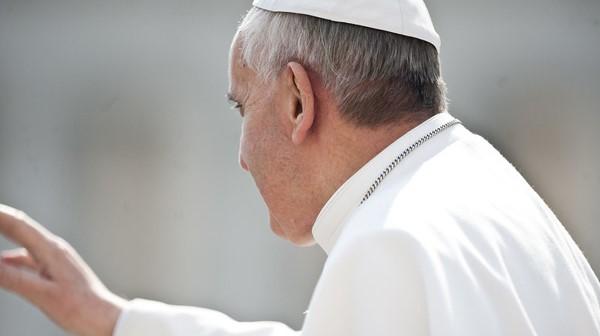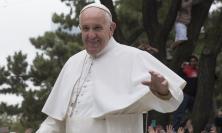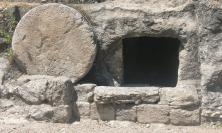Photo shared via Creative Commons (CC BY-NC-ND 2.0)
In his new book, First Belong to God: On Retreat with Pope Francis, Austen Ivereigh accompanies the reader on a journey to discover the truth of God’s love for all creation. With the pope’s own words and the Spiritual Exercises of St Ignatius Loyola as our guides, we meet Francis as a spiritual director who shepherds us out of ourselves and towards the joy of belonging.
When I was researching my biography of Pope Francis in the months after his election in March 2013 I went, of course, to Buenos Aires and other places associated with his Jesuit past. Key among them was Córdoba, in the centre of Argentina, with its beautiful estancias in the surrounding hills and its manzana jesuítica, a colonial block of the city that includes a magnificent church and a famous college. Córdoba was where, in 1958, the 22 – year – old Jorge Mario Bergoglio began his two – year novitiate. And it was where, in 1990, then in his fifties, Bergoglio returned, following a time of turbulence in the Jesuit province around the legacy of his leadership.
This, his ‘exile’, was what fascinated me: both the circumstances leading to it, and the fruitful impacts of the desolation he experienced there over two years. All this was just before he accepted, finally, the pope’s attempt to name him auxiliary bishop of Buenos Aires, in 1992. I’ve often looked back to those two years in order to understand the pontificate. And now, as I publish what I perhaps cheekily call a ‘retreat with Pope Francis’, I find myself remembering my visit to Córdoba in November 2013. I received an unexpected gift there that I’ve been unwrapping ever since, which bears particular fruit in the retreat.
Like most of the Argentine Jesuits I spoke to over those weeks, Fr Alfonso Gómez SJ – who was provincial long after Bergoglio, but knew him well – was kind and helpful, but guarded. The superior general in Rome had asked them to be prudent: journalists were raking over the new pope’s past, and the tensions were common knowledge. So I focused my questions on Bergoglio as spiritual leader and spiritual director. I knew he had published three books of his retreat talks, but I had failed to find them in the bookshops of Buenos Aires. They were out of print, and no one at that point, six months into the pontificate, had thought to republish them. But Fr Gómez had the original copies, and drew them down from a bookshelf in a small cloud of dust. I had only a few hours left in Córdoba, so he lent me them to photocopy.
Even before reading them, I knew I had struck gold. The dull titles – ‘Meditations for Religious’, ‘Spiritual Reflections on the Apostolic Life, ‘Reflections in Hope’ – belied the dynamite of the material. Here were retreat talks and addresses delivered over many years, from the early seventies when he had been made provincial, right up to the retreats and reflections he had given in his Córdoba exile, the richest and most complex of all. Over the next few months, they were a major resource for my biography, The Great Reformer. But only after I had written that book, and had time to read the three collections more deeply, did I begin to see how much the Spiritual Exercises had shaped Bergoglio’s own leadership of the Jesuits, and were now shaping the Francis papacy. The insights began to inform my own yearly eight–day retreats. And I wondered what it would be like to have been on a retreat with Bergoglio as your spiritual director.
Partly because of these texts, by the time I wrote a follow–up to the biography, Wounded Shepherd, I had come to understand him as less a ‘heroic’ leader than a ‘humble’ one. I saw how he uses discernment and dialogue to ‘conduct’ the Church through tensions and differences, helping to open us to the graces of conversion God offers precisely in such moments of choosing. I coined a phrase that caught on: Francis was ‘humanity’s spiritual director’. It seemed to me that he was conducting the Church rather as a director facilitates the Spiritual Exercises, allowing the Creator to communicate directly with his creatures, as St Ignatius puts it (SpExx §15). Humility, then, was not just Francis’ great virtue, as it was for Ignatius. It was also his programme, his magisterium.
The pontificate’s purpose, I realised, was to enable the Church to be more responsive to the guiding presence of the Spirit, especially in moments of crisis. This meant ‘coming out of ourselves’, to use a favoured expression of Francis’. In the original Greek, krisis means ‘choice’. In the concrete events and experiences that we live through both as individuals and as societies, we constantly face tensions of time and space, fullness and limit. God’s Spirit is at work in these spaces, and can be recognised by the consolation it brings, and the agitations it provokes. Adjusting to this, opening ourselves to the movements in the moments, is what we learn to do, through prayer and dialogue, and above all at special ‘desert’ times, times of exile and retreat.
Then came the pandemic, and Francis was energised. You could see it in his words and actions. Amidst the suffering, the world was suddenly on retreat, and he was leading us as a spiritual director does, steering us between the rocks to the bigger horizon ahead, warning of the temptations and obstacles that would close us in on ourselves. He told us we couldn’t come out the same; we could only come out worse or better. Better would be to open ourselves to the graces on offer: to come out of ourselves, to transcend the boundaries of our thinking and habits, and to welcome the new thing God was doing among us. Worse would be to close down in beleaguered distrust – the big temptation of today, for Francis. (‘This is not a time to hunker down and lock our doors,’ he says in his foreword to First Belong to God, adding: ‘I see clearly that the Lord is calling us out of ourselves, to get up and walk.’) Better meant to contemplate what was happening, see the different spirits at work, and have the humility not to stick to the old script but to see what was true and solid and life–giving. Better meant to choose these – what was of God – over the death–traps masquerading as solutions.
In mid–2020 I had begun working with Francis on a book that allowed him to explain all this. Let Us Dream: the Path to a Better Future came out at the end of that year, and was a kind of a retreat. The reader could pick it up, and feel as if she were sitting with Francis, who spoke to her directly, naturally, asking her questions, inviting her to take stock of what was happening in the Covid-19 crisis: what it revealed about us, and the changes that were needed. In 2021–22, Let Us Dream was used by countless parishes and organisations in discussions and book clubs. People met online to discuss it over a series of weeks.
Just as I was working on Let Us Dream, I was giving daily input in July 2020 on an eight–day retreat organised by the British Province of the Society of Jesus. It was the idea of the then provincial, Damian Howard SJ, to organise the Spiritual Exercises for Jesuits and their collaborators around the big themes of the pontificate. This is the origin of First Belong to God.
Because lockdown prevented us meeting in St Beuno’s Jesuit Spirituality Centre in north Wales, the theme – on the crisis of belonging in a time of crisis – was appropriate. So, too, was the format. An eight-day lockdown retreat on Zoom, together yet apart, reflecting on the bonds that connected us, was a great way into a pontificate that sees our current malaise as a threefold crisis of belonging: to God, to creation, and to each other. The loss of sense of belonging to a single human family that is part of creation means we are uniquely ill–prepared to manage the transition to a better future. Hence the signature teachings of the pontificate: Evangelii gaudium, on our belonging to God; Laudato si’, on our belonging to creation and our fellow not-just-human creatures; and Fratelli tutti, on our belonging to each other in human community. In each case, our task is to overcome our distrustful self-witholding, our grasping rivalry, our desire to dominate and instrumentalise; these are the sinful states that keep us imprisoned in non-belonging.
First Belong to God: On Retreat with Pope Francis has developed that 2020 gathering, incorporating those three volumes of Bergoglio’s Jesuit retreat talks, as well as the Spiritual Exercises he gave the Spanish bishops in 2006. Of particular importance has been his 2018 exhortation on holiness, Gaudete et exsultate (‘Rejoice and Be Glad’), which is in many ways a wisdom summary of a life embedded in the Exercises, with an ever deeper love of and friendship with Christ. The book’s title is taken from paragraph 65 of Gaudete et exsultate: ‘Only on the basis of God’s gift, freely accepted and humbly received, can we cooperate by our own efforts in our progressive transformation’, Francis writes. ‘We must first belong to God, offering ourselves to him who was there first, and entrusting to him our abilities, our efforts, our struggle against evil and our creativity, so that his free gift may grow and develop within us.’ To learn to belong is to learn to accept the gift that God gives us in creating us and making us restless for life in him. With that understanding – and it must be grasped with the heart as much as the mind – comes the freedom to belong, to serve, to love.
In his beautiful foreword to the book, Francis writes that St Ignatius of Loyola saw life as ‘a struggle to overcome the temptation of closing in on ourselves, so that the love of the Father can make its home in us.’ Only when we are rescued from our mythical self-sufficiency do we open up to creation and every creature, he writes, and become channels of life and love. ‘Only then do we realize what life truly is: a gift of the Father who loves us deeply and desires that we belong to him and to each other.’
First Belong to God is an eight-day journey to discover that truth. Days One, Two and Three are taken from the First Week of the Exercises: embracing our creatureliness, receiving God’s mercy and rejecting worldliness. Days Four, Five and Six take us into the famous contemplations of the Second Week – the Call of the King, the Two Standards, the Three Kinds of Men – around core themes of the pontificate: the gaze of mercy in the migration choice, the choices demanded by ecological conversion, and the humility and mindset needed for synodality. Day Seven, ‘the Triumph of Failure’, is the Third Week contemplation of the Cross, and the meaning of patience and failure, while Day Eight, ‘A New Imagination of the Possible’, takes us into the contemplations of the Fourth Week, and the new kind of belonging brought about by the resurrection of Christ.
The attempt to see the pontificate through the Spiritual Exercises, and to approach the Exercises through the pontificate, has helped me to see those connections, and the depth of the moves Francis has made these past eleven years. It was pre-announced in his pre-conclave speech to the cardinals, when he said that the next pope should enable the Church to ‘go out from itself’ (salir de sí misma) to the peripheries. He didn’t just mean be more missionary, or focus more on evangelisation, or take into better account the realities of pain and suffering in our world. He meant be capable of self-transcendence, to move out from the boundaries of our thinking, to open ourselves to the action of God’s Spirit and the new thing God is doing.
That’s what he was offering in those three books I was given in Córdoba. They remain unpublished in English, but in drawing on them, at least First Belong to God will give some sense of what it was like to have the future Pope Francis as a spiritual director. But mainly First Belong to God is about the pontificate: not just understanding it, but applying it, as individuals, but also parishes, dioceses, organisations. Because this is a time of krisis, and what will bring us through it better is embracing the truth of who we are, and to whom we belong. And that means coming out of ourselves to receive the guidance of one who made us.
Dr Austen Ivereigh is a Fellow in Contemporary Church History at Campion Hall, University of Oxford. First Belong to God: On Retreat with Pope Francis, is available now from Messenger Publications and Loyola Press.






